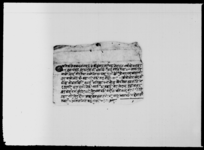A letter from Subedāra Śaraṇabhadra Silavāla seeking assistance from Ḍhevā Khāmsāṅ Vāṅdī in collecting money lent to Dhāvā Chiriṅ (VS 1934)
ID: E_3446_0027
Edited and
translated by Rajendra Shakya
in collaboration with
Rabi Acharya
Created: 2019-04-05;
Last modified: 2020-11-23
For the metadata of the document, click here
The accompanying edition, translation/synopsis and/or commentary are available under the terms of the Creative Commons Attribution-ShareAlike 4.0 International License
Abstract
This is a personal letter written by Subedāra Śaraṇabhadra Silavāla to Ḍhevā Khāmsāṅ Vāṅdī seeking his assistance in collecting money he lent to Dhāvā Chiriṅ across the border.Diplomatic edition
[1r]
1श्रीः\[Unknown Seal]1स्वस्तिश्रीढेवाषाम्सांव़ाङ्दीकेश्रीसुवेदारसर्णभद्रसिलुव़ालक्षत्रीकोसलाम्उ2प्रान्तसुव्वान्याव़ाङ्षुनुकाजुव़ाञींधाव़ाछिंरिंलाईमोहरुपैया२००सापटीदि
3याकोथिञ्यूंसोरुपैयामध्येनिजकादाज्यूपासांछिरिंलेनगदनम्वुच्यांग्रागरि
4वुझायाकोज्मारू९०कट्टागरिवाकीसाउमोहरु११०र५वर्षकोव्याजस्मेत्वा
5कीछत्योधाव़ाछिरिंतपाञीँकापिछ्यापर्याकोछत्योरुपैयातपाञीँलेभ
6न्सुन्गरि∙हरतरहवाटझिकीतपाञींकासम्दीमेरामित्ज्यू∙सुव्वान्याव़ाङ्
7षुनुकाहातमावुझाउनुलाइदिनुभयावढीयाहोला∙यतिकाम्तपाञींलेमेरो
8गुहारगरिदिनुहोला∙आफ्नाछेमकुसलवरोवरपठाउनुभयावढीयाहोलाइति
9सम्वत्१९३४सालमितिफागुणवदी१०रोज२शुभ्म्∙¯¯¯ ¯¯¯ ¯¯¯ ¯¯¯ ¯¯¯ ¯¯¯
Translation
[1r]
[Unknown seal]1
Hail! To Śrī Ḍhevā2 Khāmsāṅ Vāṅdī (text: Ṣāmsaṃ Vāṅdī)
Salutations from Śrī SubedāraŚaraṇabhadra Silavāla Kṣetrī (text: Sarṇabhadra Siluvāla Kṣatrī)
Uprānta: I lent 200 mohararupaiyā̃s to Dhāvā Chiriṅ (text: Dhāvā Chiriṃ), son-in-law of SubbāṄavāṅ Khunu (text: Nyāvāṅa Ṣunu)3 . Of that amount, 110 mohararupaiyā̃s from the principal is outstanding, along with 5 years' interest, after deducting a total of 90 mohararupaiyā̃s in the form of cash, nambu4 and Tibetan goats (cyāṅgrā) tendered by the said person’s elder brother Pāsāṅ Chiriṅ (text: Pāsāṃ Chiriṃ).
Dhāvā Chiriṅ is under your protection. It would be great if you could get that money out [of him] by requesting [it from him] or by any other means, and have it handed over of your samdhī5 and my intimate friend, Subbā Ṅavāṅ Khunu. Will you be so good as to assist me in so weighty a matter?
It would be great, [too,] if you regularly informed [me] about your own welfare (chema kusala).
Monday, the 10th of the dark fortnight of Phālguṇa in the [Vikrama] era year 1934 (1878 CE)6 . Auspiciousness.
Commentary
This personal letter from Subedāra Śaraṇabhadra Silavāla Kṣetrī is interesting for a number of reasons. In another document, E_3446_0028, there is mention of a ‘ḍhevā of Kerung’, Kerung being a region in southern Tibet. There the ḍhevā's name is not given. The term ḍhevā itself seems to have been a post within the Tibetan administration. Thus the Khāmsāṅ Vāṅdī of the present document is likely a Tibetan government officer and a Tibetan counterpart of Subedāra Śaraṇabhadra. That would mean that Dhāvā Chiriṅ, who borrowed 200 mohararupaiyā̃s from Śaraṇabhadra, is also apparently a Tibetan, as the document mentions that he is under the protection of Khāmsāṅ Vāṅdī.
Interestingly, Dhāvā is the son-in-law of Subbā Ṅavāṅ Khunu, who in turn is the samdhī of Khāmsāṅ Vāṅdī and a good friend of Śaraṇabhadra. The triangular relation among the debtor Dhāvā Chiriṅ, his father-in-law Ṅavāṅ Khunu and Khunu’s samdhī Khāmsāṅ Vāṅdī is a bit confusing. It is clear that a daughter of Ṅavāṅ Khunu was married to Dhāvā. Probably a daughter of Khāmsāṅ Vāṅdī was married to a son of Ṅavāṅ Khunu. This suggests that cross-border marriages, which are now no longer customary in the area, were more so back then. We cannot be certain whether such marriage ties between families of Nepalese and Tibetan government officials were politically motivated, but it does appear that the ties were strong, as Śaraṇabhadra mentions his close friendship with the Nepalese subbā, which clearly is an attempt to use the subbā’s familial ties with the ḍhevā to retrieve his money from a person across the border.
The very fact that a Nepalese government officer, Subedāra Śaraṇabhadra, lent the hefty sum of 200 mohararupaiyā̃s to Dhāvā Chiriṅ, a Tibetan civilian (at least no formal post is mentioned in connection with him in the document) suggests that the bilateral ties between the two nations were strong, at least at the local level. Unfortunately, however, Śaraṇabhadra got himself into an uncomfortable situation after lending a huge sum based on personal acquaintances, as the debtor, for reasons unknown, delayed paying back the loan and the interest for five years. It is not clear if he ever eventually did.

